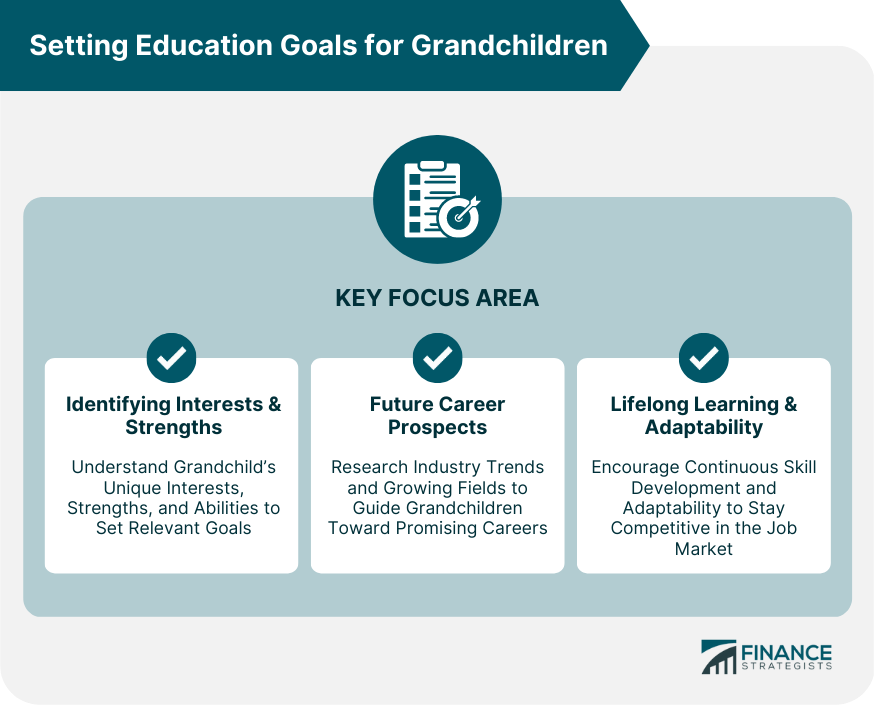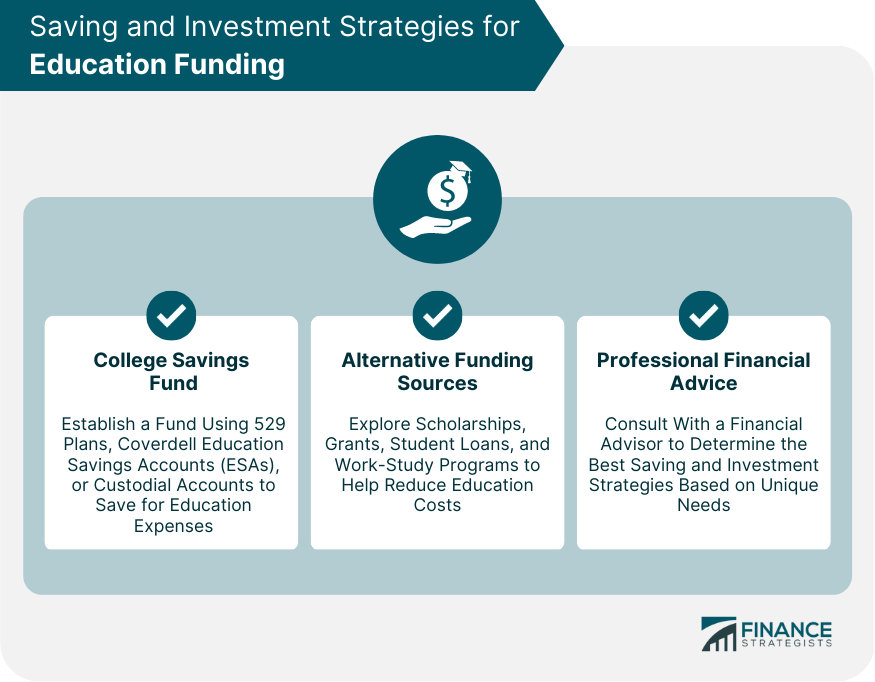Education is one of the most important factors that can shape a child's future. As grandparents, you have the opportunity to play a significant role in your grandchildren's education by helping them plan for their academic journey. Educational planning for grandchildren involves considering a wide range of factors such as their interests, abilities, learning style, and career aspirations. By working with your grandchildren and their parents to create a roadmap for their education, you can help set them up for success in school and beyond. Whether it's helping them choose the right school, selecting appropriate courses, or guiding them through the college application process, your involvement and support can make a significant impact on their academic and career success. In this rapidly changing world, it's more important than ever to ensure that your grandchildren receive a quality education that equips them with the skills and knowledge they need to thrive. To set appropriate educational goals for grandchildren, it is crucial to understand their unique interests, strengths, and abilities. Grandparents can facilitate open and honest conversations with their grandchildren to learn more about their passions and ambitions. This understanding will help establish realistic and attainable goals that align with the grandchild's aspirations. It is essential to consider the future job market and career prospects when setting education goals for grandchildren. Researching industry trends and growing fields will help grandparents guide their grandchildren toward promising educational paths that will prepare them for successful careers. Grandparents should promote the importance of lifelong learning and adaptability to their grandchildren. By emphasizing these values, they can inspire their grandchildren to continuously develop new skills, stay updated on industry trends, and adapt to the ever-changing job market. There are several college savings options available for grandparents to help fund their grandchildren's education: 1. 529 Plans: These tax-advantaged savings plans allow for tax-free growth and withdrawals for qualified education expenses. 2. Coverdell Education Savings Accounts (ESAs): These accounts offer tax-free growth and withdrawals for qualified education expenses but have lower contribution limits compared to 529 plans. 3. Custodial Accounts (UGMA/UTMA): These accounts allow grandparents to transfer assets to their grandchildren, which can be used for education or other purposes. Grandparents should also consider alternative funding sources for their grandchildren's education, such as: 1. Scholarships and Grants: Encourage grandchildren to apply for various scholarships and grants, which can significantly reduce education costs. 2. Student Loans: Federal and private student loans can help cover education expenses, but it is essential to understand the repayment terms and interest rates. 3. Work-Study Programs: These programs offer students part-time employment opportunities to help pay for their education. Consulting with a financial advisor can help grandparents determine the best saving and investment strategies for their grandchildren's education funding. A professional can provide personalized advice based on the grandchild's unique needs and financial situation. It is essential for grandparents to periodically review and update their education goals and funding strategies to ensure they remain relevant and effective. Regular check-ins will help grandparents stay informed about their grandchildren's progress and make necessary adjustments as needed. Grandparents should be prepared to adapt their education plans in response to changes in their grandchild's interests, needs, or financial situation. Open communication with parents and grandchildren will help grandparents stay informed and make well-informed decisions. Grandparents can support their grandchildren's educational journey by encouraging academic excellence and participation in extracurricular activities. These efforts can help grandchildren develop essential skills, strengthen their college applications, and increase their chances of receiving scholarships and grants. Grandparents can play a crucial role in their grandchildren's lives by providing mentorship and guidance. By sharing their wisdom, experiences, and insights, grandparents can help their grandchildren navigate challenges, make informed decisions, and foster personal and academic growth. The emotional and moral support that grandparents offer can significantly impact their grandchildren's well-being and academic success. By being present, offering encouragement, and celebrating achievements, grandparents can foster a supportive environment that promotes growth and learning. Unforeseen circumstances may arise, making it essential for grandparents to establish contingency plans for their grandchildren's education. These plans should consider potential changes in education costs, financial aid availability, and personal financial situations. Grandparents may want to explore insurance options such as life insurance and disability insurance to protect their grandchildren's education funding. These policies can provide financial security in the event of unexpected challenges, ensuring that the grandchildren's education plans remain intact. Grandparents can play a crucial role in their grandchildren's education planning by helping them set relevant goals, providing funding strategies, and supporting their educational journey. Setting appropriate education goals involves understanding their unique interests and abilities, researching industry trends, and emphasizing the importance of lifelong learning and adaptability. Grandparents can use several college savings options such as 529 plans, Coverdell ESAs, or Custodial accounts to help fund their grandchildren's education. They should also consider alternative funding sources such as scholarships, grants, student loans, and work-study programs. Periodic reviews of education goals and funding strategies will help grandparents stay informed about their grandchildren's progress and adjust the plans as necessary. Grandparents can offer support to their grandchildren's educational journey by encouraging academic excellence, offering mentorship and guidance, and providing emotional and moral support. Finally, grandparents should establish contingency plans and consider insurance options to protect their grandchildren's education funding in the event of unexpected challenges.Importance of Education Planning for Grandchildren
Setting Education Goals for Grandchildren

Identifying and Understanding Interests and Strengths
Considering Future Career Prospects and Job Market Trends
Encouraging Lifelong Learning and Adaptability
Saving and Investment Strategies for Education Funding

Establishing a College Savings Fund
Exploring Alternative Funding Sources
Seeking Professional Financial Advice
Monitoring and Adjusting Education Plans
Regularly Reviewing Education Goals and Funding Strategies
Adjusting Plans Based on Changes in Interests, Needs, or Financial Situation
Supporting the Grandchild's Educational Journey
Encouraging Academic Excellence and Extracurricular Activities
Offering Mentorship and Offering Mentorship and Guidance
Providing Emotional and Moral Support
Planning for the Unexpected
Establishing Contingency Plans
Considering Insurance Options
Conclusion
Education Planning for Grandchildren FAQs
Education planning for grandchildren involves setting education goals, understanding their interests and strengths, considering future career prospects, saving and investing for education funding, monitoring and adjusting education plans, and providing emotional, moral, and mentorship support throughout their educational journey.
Education planning for grandchildren is essential for grandparents because it helps secure a bright future for their loved ones. By actively participating in the planning process, grandparents can provide invaluable support, contribute to their grandchildren's educational success, and strengthen intergenerational bonds.
Effective saving and investment strategies for education planning for grandchildren include establishing a college savings fund (such as 529 plans, Coverdell ESAs, or custodial accounts), exploring alternative funding sources (like scholarships, grants, student loans, and work-study programs), and seeking professional financial advice.
Grandparents can support their grandchildren's educational journey by encouraging academic excellence and participation in extracurricular activities, offering mentorship and guidance, providing emotional and moral support, and staying actively involved in setting education goals and monitoring their progress.
When adjusting education plans for their grandchildren, grandparents should consider changes in the grandchild's interests, needs, or financial situation. They should also be prepared to adapt to unforeseen circumstances by establishing contingency plans and exploring insurance options to protect education funding. Regular communication with parents and grandchildren is crucial for staying informed and making well-informed decisions.
True Tamplin is a published author, public speaker, CEO of UpDigital, and founder of Finance Strategists.
True is a Certified Educator in Personal Finance (CEPF®), author of The Handy Financial Ratios Guide, a member of the Society for Advancing Business Editing and Writing, contributes to his financial education site, Finance Strategists, and has spoken to various financial communities such as the CFA Institute, as well as university students like his Alma mater, Biola University, where he received a bachelor of science in business and data analytics.
To learn more about True, visit his personal website or view his author profiles on Amazon, Nasdaq and Forbes.











